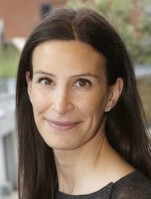Therapy Q&A Session with Dr Sheri Jacobson
 Dr. Sheri Jacobson, Psychotherapist and Director of Harley Therapy answers questions put forward by a 3rd year Psychology student at a University in Holland.
Dr. Sheri Jacobson, Psychotherapist and Director of Harley Therapy answers questions put forward by a 3rd year Psychology student at a University in Holland.
Q: What is the main target group for therapists working at Harley Therapy?
A: I don’t think the therapists set out to target a specific group, but the main clientele have turned out to be professionals working in or close to the City of London. However, the therapists see clients from many other sections of the population.
Q: There are a lot of disorders the therapists work with; what is the main specialism?
A: All therapists work independently and each have their own specialities as well as having general training. So most client groups, as well as most presenting issues, can be worked with.
Q: Do you think some of the disorders are culture-bound or specific for one culture?
A: By virtue of living and/or working in a busy, Western city, I think that many of the presenting problems might be culture-bound. For example, we might be more prone to work stress and burnout than in other societies which don’t place as much emphasis on working/making money. Similarly, we might have a greater prevalence of relationship breakdowns, which might be related to our strong attachment to freedom of choice (and less stigma about divorce). Another issue is that parents with dispersed families living in different countries don’t have the family support to help with child-rearing as other cultures do; this can result in certain stresses.
Q: What do you find the most difficult disorder to treat and why?
A: Most issues can be worked with providing that the client is motivated. The simplest disorder will have little chance of being worked through if the client has no interest in changing. However, there are certain disorders which are known for being quite intractable and where therapy alone may not be enough – for example, eating disorders such as anorexia and serious drug addiction such as heroin use. Therapists in private practice may struggle to offer the necessary support of hospital-based testing and facilities and, for this reason, a rehabilitation centre might be a better course of action than therapy. However, a private psychiatrist may still be able to assist with a diagnosis and then recommend an external referral.
Q: Do Counsellors/Psychotherapists/Psychologists and Psychiatrists often work/consult together? If so, in which cases?
A: Yes they do. It is an important part of private practice to realise your limitations and refer to another professional where needed. Therapists are not medically qualified, and there are many cases where a psychiatrist’s assessment may be appropriate; for example, psychosis, schizophrenia and some personality disorders (eg anti-social). Also, they would be able to prescribe medication whereas most therapists cannot. Many therapists and psychiatrists know each other (many have worked or studied in the same institutions) and consult about clinical issues regarding clients/patients for their rounded care.
Q: In Holland, it takes four years to study Psychology (College or University), three years to finish the Bachelor and one year to complete the Master. Is this the same for the UK?
A: There are different training routes, but yes, 8 years often leads to being a qualified practitioner holding a Masters or Doctorate in Counselling Psychology.
Q: Do the professionals working in private practice, also work elsewhere?
A: It’s usual for therapists and psychiatrists have several places of work. Often therapists work in the NHS full-time and carry out private practice from our premises in the evenings and weekends.
Q: What is it like to work in London?
A: I think it’s wonderful. Most therapists say they particularly enjoy it because of the diverse range of clients that the City brings.
Q: Why are the most common reasons for finding a Counsellor related to Stress, Anxiety, Relationship Problems, Anger-Management, Depression and Sexual Issues?
A: I think it is because these are issues that are prevalent in the UK population as a whole. Drug and alcohol over-use is also widespread, but not as many people seek help for this as for example, stress and relationship problems.
Q: After the treatment is finished, is there a standard evaluation programme for the clients?
A: It depends. Some clients who have ended therapy are sent feedback forms at the request of the therapist. Therapists may ask clients to complete evaluation forms based on their mode of treatment. Cognitive Behavioural Therapy tends to involve form-filling, whereas psychodynamic therapy typically would not.
Q: Are there things you could improve on in the future?
A: One of the things we would like to improve on is giving free information to people who cannot afford therapy services or who live abroad (and don’t wish to have telephone counselling). To this effect there is a self-help reading section on the website, and I post articles on our counselling blog.
Q: What is the most important thing that you’ve learned about therapy?
A: That therapy cannot be applied mechanically; each client is unique, bringing very different life histories, and that each person’s pain and difficulties is as valid as another’s. Even though we might be working with the issue e.g panic attack, or abuse, a client’s life story is so personal that an individualised approach, and open-mindedness, is needed.




